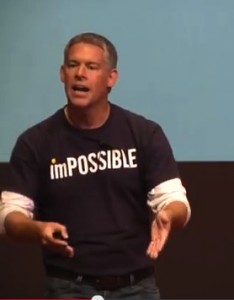Doing the Impossible
 Aaron Donaghy is a high school teacher in Detroit whose mission is to teach his students how to do what sounds impossible. His leadership program offers students the opportunity to make a difference in the world—before they graduate, before they hold a job, before they become adults. In fact, many of his students do more for other people, as high school students, than many adults ever do in their entire lives.
Aaron Donaghy is a high school teacher in Detroit whose mission is to teach his students how to do what sounds impossible. His leadership program offers students the opportunity to make a difference in the world—before they graduate, before they hold a job, before they become adults. In fact, many of his students do more for other people, as high school students, than many adults ever do in their entire lives.
He created his leadership program as a way of raising self-esteem for his students. He didn’t like the way the grading system became a personal scorecard that could de-motivate his students. Rankings like grades became the basis for a teen’s self-image. The world, for these students, divides into those who see themselves as winners and others who feel like losers. Donaghy wanted to break out of that system and show students, at all levels, that they could take action to make a difference in the world.
His program revolves around three assertions:
- Anyone can lead.
- Small groups can change the world.
- Everything is impossible until it’s done.
When he speaks, he tells stories. Each story revolves around one or more of his students who learn how to become leaders. Take Will. From elementary school on, Will didn’t fit in. He didn’t have friends. He never had a birthday party, and was never invited to one. Sleepovers? Same thing. By the time he reached middle school, he was starved for attention, craving it. So he did anything he could to get it. When a teacher refused to let him go the bathroom in the middle of class, he urinated on her. “It gets worse,” Donaghy says. “By the time he gets to eleventh grade, he cheats. Runs with the wrong crowd. He’s suspended thirty times.”
“It’s the end of Will’s junior year and I’m doing interviews. Who walks in? Will. He comes over to me, six feet three, and looks down at the table. I look at the principal and I can see in his eyes, there is no way this kid gets into this program. Will says to me, ‘Mr. Donaghy, if I can change and be a leader then people like me will be able to do the same thing. If I can do it, they can do it.’ Don’t tell me that kid isn’t a leader.”
End of story: a year later, Will is elected homecoming king at his senior prom. The other students embraced him as a hero because he took a risk and committed to changing himself. He followed his passion and became an example for all the rest. Even at six foot three, he went to Los Angeles and danced for Rihanna, then tried out for a show called So You Think You Can Dance. “This is a kid who almost didn’t get into the leadership program, and he’s inspiring others to follow their dreams.”
Another group of kids who joined his program ended up building an orphanage in Tanzania. Donaghy helped assemble a team of students to raise money for the new structure. “These people (in Tanzania) make fifteen cents a day, they eat what they grow. My friend there said our birth rate is high, but so is our death rate. A lot of kids don’t have anywhere to go.” In Tanzania, they had six orphans staying in a storage room. “We raised the money, over two years. Brick by brick, my students saw the women and the children building the walls. Ninety-six African kids live in the orphanage now. Three square meals. My students saw their money translated into bricks over those two years.”
The key to their motivation: they removed the middleman. They didn’t hand the money they raised to a charity. They sent it directly to the people in Tanzania who then sent a constant stream of pictures to show exactly how those those dollars were translated into bricks and mortar. They literally saw how they could change the world.
“ You have to let the kids see how they can change the world,” he says.
Do you have any stories of young people who have make similar choices and have discovered how to change a part of their world for the better?